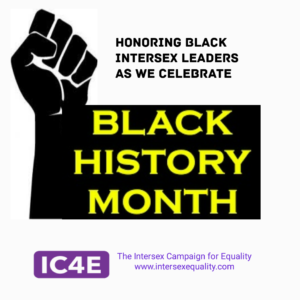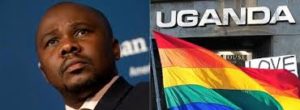Celebrating Black History Month: Julius Kaggwa

Today we honor celebrated Ugandan activist Julius Kaggwa, executive director of the intersex support organization Support Initiative for People with Atypical Sex Development (SIPD), whose pioneering human rights work began in the late 1990’s. We commend him for his inspirational impact, courage, and dedication as a first wave intersex activist in Africa whose work continues as strongly as ever today!

In 2010, Kaggwa was honored as a joint winner of the Human Rights First–an independent American advocacy and action organization–Human Rights Award. As Human Rights First recognized, “Kaggwa has led the fight against a draconian anti-homosexuality bill in Uganda that aims to make engaging in any homosexual act a crime—in some cases punishable by death. Kaggwa also works to create a more tolerant environment for sexual minorities and their supporters in Uganda. Kaggwa has been harassed and threatened because of his work, but he continues to fight for human rights, playing an increasingly public role despite the danger he faces daily.”
As Kaggwa, who is widely published, shared in The Guardian in 2016: “I became an activist after helping a young intersex boy, who was due to appear on the radio to try to raise money to have his breasts surgically removed. He was the first person ever to look at me with eyes that said ‘you can help me.’ I was concerned for him because people have so many questions. …You’re taught growing up as an intersex person in Uganda that your body is no longer your property. It is to be abused, examined and tested against your will.”
As shared in numerous interviews over the years, Kaggwa was assigned female at birth and raised as a girl but knew from an early age that he is a man. “It was very difficult and on several occasions I actually felt suicidal because I didn’t think what I see now was possible… But sharing my story and my experiences with my own friends helped and then I started to get support from my own family and I think that was the major positive for me. My family was very supportive right from my childhood when they were hiding me and trying to figure out how to handle this intersex issue. I’ve always been very supported.”
In 1996, Julius’s journey to self-determination made the news when he married a woman and the headline of Uganda’s The New Vision read, “Old Gayaza girl weds fellow woman.” In 1997, he published the story of his gender identity experience as an intersex person in his groundbreaking book, From Juliet to Julius: In Search of My True Gender Identity (Fountain Publishers). His story was also explored in the short video, She Is My Son, below.
We recognize that life as an openly intersex person in Africa has been and continues to be increasingly difficult. His recounting of the experience brings to light the ways in which discrimination against intersex people often overlaps with that of LGBTQ people. “I have suffered harassment throughout my life, including from my in-laws from my first marriage. They became very abusive, both verbally and physically. At one point my sister’s husband tried to rape me – it’s curious type of “cure” also inflicted on lesbians to “correct them”.
Kaggwa was among the very first to call attention to the infanticide of intersex babies by midwives and other birth care attendants in Africa, and in 2011, his work for LGBTI Ugandans was recognized as a joint winner of the U.S. State Department’s Human Rights Defenders Award. According to Kaggwa, Uganda’s “Kill the Gays” bill (as LGBTQ activists called it), introduced in October 2009, made all sexual minorities more vulnerable to violence and discrimination. He can be seen speaking about the role American religious groups played in promoting the bill, and his work fighting it, in the excellent short video below.
Kaggwa has also been a member of the international intersex movement since its inception as a former board member of the first international intersex advocacy organization, the Organisation Intersex International (OII, founded in 2004), and more recently as a frequent participant of the International Intersex Forums, which began in 2011.
By bravely sharing his story at a time when it was very uncommon and dangerous to do so, and advocating for recognition and equality for intersex and gender variant people, Kaggwa has helped countless generations of LGBTQI Africans–and he continues to despite increasing difficulty. As he explained in The Guardian in 2016 in the piece, “I’m an intersex Ugandan – life has never felt more dangerous,” due to their repressive government, “Times have never been harder for LGBTI activists in Uganda. …people from our community around the country have been telling us it’s increasingly hard to find a safe space to seek medical or psychological support.”
Today, as he has for decades, Kaggwa continues educating the public at large while also working to support intersex people and their families on the ground, in Uganda, with SIPD. Last year, the Open Society Foundation even made this amazing animated video, narrated by Kaggwa himself, about his amazing journey as a person and activist.
We commend Kaggwa for his immense courage in paving the way for visibility and equality for intersex–and indeed all LGBTQI people–in Africa, and for his amazing perseverance in the fight for equality!
